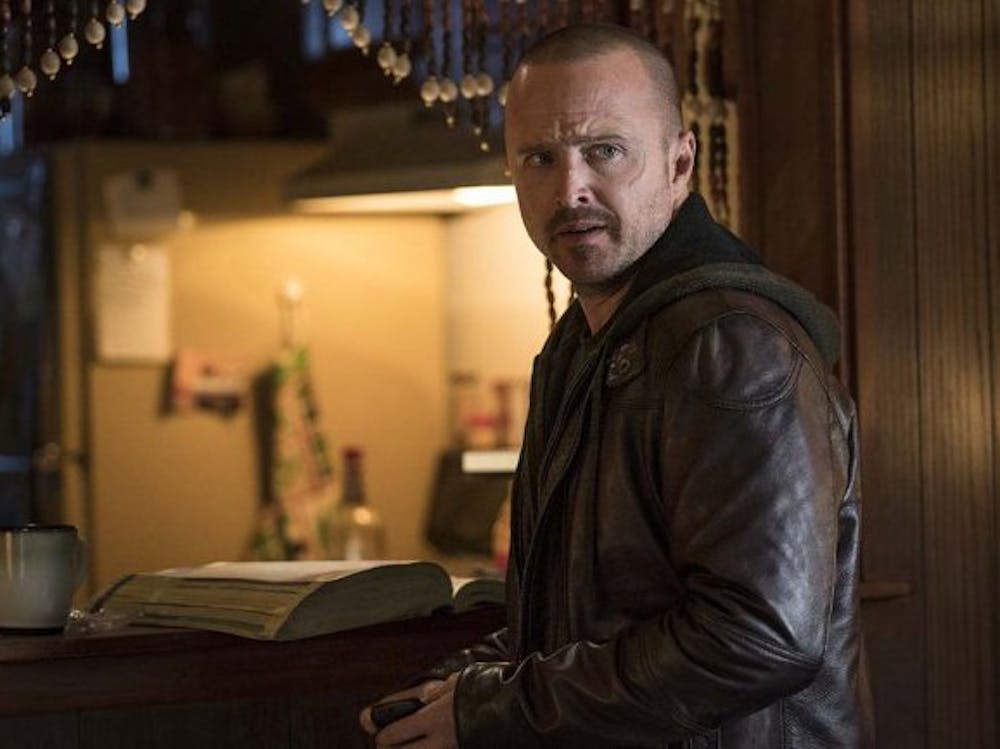In a perfect world, “Breaking Bad” would be on television forever. The universe that Vince Gilligan painstakingly established and populated over the course of the series’ five seasons is one of the richest ever to exist on the small screen, deftly combining the sandy drudgery of life in suburban New Mexico with the thrilling danger of drug production and trafficking. It is a world so enchanting in both its scope and its finely-crafted minutiae that it could theoretically spawn an infinite number of stories, covering every character and how each decision they make ripples throughout the community and the drug empire situated just beneath it.
Some of those stories are currently being told on prequel show “Better Call Saul” — whose enduring success and critical acclaim has proven that Vince Gilligan is far from a one-hit wonder — but the series’ occasional detour into “Breaking Bad” lore wasn’t enough for fans craving a committed return to the Heisenberg empire. They wanted to visit that world one more time, and they finally got to with “El Camino: A Breaking Bad Movie,” an epilogue that functions as a final trip down memory lane.
“El Camino” opens directly after “Breaking Bad”’s finale, with Jesse Pinkman — played sublimely, as always, by Aaron Paul — speeding away from the compound where he’s been held captive by neo-Nazis after finally being freed by Walter White. His triumphant escape quickly proves to be the first step on a long journey toward extricating himself from the wreckage of his former life and starting a new one. Saddled with PTSD from his time in captivity, Jesse must find his footing as an independent man after playing sidekick for so many years and learn to rebuild himself in the wake of losing everything.
Where “El Camino” could have easily been a greatest-hits episode of “Breaking Bad,” sticking in any character whose actor was willing to return for a cameo and filling every frame with references, it instead commits to studying Jesse and bringing his story to an end. Jesse has long been one of “Breaking Bad”’s most popular characters — so popular, in fact, that he would have been killed off in season one had he not been met with such acclaim — with his evolution from apathetic drug dealer to martyr serving as a perfect foil for Walt’s own hubris-fueled descent into villainy. The decision to focus the film on Jesse creates enough narrative thrust to both carry the plot forward and justify the movie’s very existence, given Jesse is one of the few characters left alive at the show’s end, as well as one of the few deserving of a truly happy ending.
This justification, however, only serves as a foundation for what ends up being a thoroughly competent but ultimately unnecessary dive back into the world of “Breaking Bad.” While Vince Gilligan’s direction and writing have lost very little luster in the years separating this film from its predecessor, “El Camino” never reaches the visual or narrative heights of the original show and, in fact, lacks some of the cinematic grandeur that made the former so impressive.
“Breaking Bad”’s trademark manner of generating realistic conflicts and having the characters arrive at genuinely creative solutions is somewhat realized here, particularly during Jesse’s confrontation with his former captors, but no scene ever truly captures any sense of suspense or danger. The viewer knows Jesse is going to escape every confrontation and eventually secure his freedom: This much is not quite telegraphed but instead conferred by the very nature of the universe he occupies. Jesse is a fundamentally good soul — a fact reaffirmed by his shown affinity for all of God’s smallest creatures — whose prolonged suffering is revealed frequently through flashbacks and poignant reminders of the people he’s lost, both figuratively — his estranged parents — and physically — Jane and Andrea. Those familiar with how the world of “Breaking Bad” operates will find every narrative twist and turn predictable, since each will inevitably bring Jesse closer to the liberation he has been promised for his inherent nobility.
Although “El Camino” plays like a couplet of standard “Breaking Bad” episodes with only some of the latter’s flair and intrigue, it is nevertheless an entertaining and, at times, emotional piece of filmmaking. The performances are outstanding across the board, with Jesse Plemmons returning in flashbacks to shade in his character’s chilling sociopathic tendencies and the late Robert Forster giving a delightfully understated cameo that nicely bookends his film career. Gilligan’s camerawork is particularly gorgeous, from the disorienting transitions connecting past and future scenes to the hauntingly empty landscapes of New Mexico that once held infinite promise for Walt and Jesse.
While the film’s finale is expected, it is lent real emotional weight by Paul’s brilliant work and a touching callback that sweetens the movie’s final chord. “El Camino” might have only been made to provide superfluous closure for a show that was by all means a perfect package, but no amount of nostalgic excess can dampen the talent of the show’s cast and crew. It’s not unlike catching the sunset in the rearview mirror as one drives away from their beloved hometown — fleeting and familiar, but nevertheless beautifully comforting.
Get The Chronicle straight to your inbox
Signup for our weekly newsletter. Cancel at any time.

